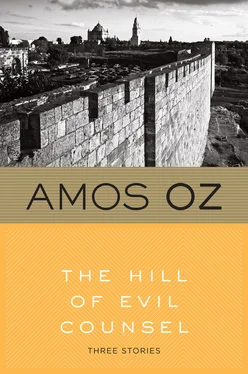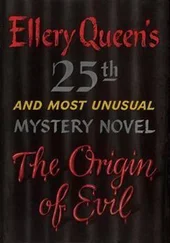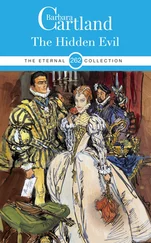September 5
Evening again
Dear Mina,
I should have told Professor Dushkin there and then on Mount Scopus that I could on no account accept his harsh words about Moshe Shcrtok and Berl Locker. After all, these poor delegates of a tiny, isolated community are almost empty-handed. And I should have told the engineer from the Jewish Agency that it would be better for them to give up their useless fantasies about mysterious weapons and start making clear-sighted preparations for the departure of the British army and the impending war. And I should have tried to put up a fight — forgive me for using such a hyperbolic expression — to put up a fight for the soul of my child, my neighbors' child, to put a firm stop to his games of conquest, to get him out of my laboratory, to produce sensible arguments to counteract the romantic dreams with which his Cossack Bible teacher has apparently filled the boy's head.
But I cannot deny that these romantic dreams sometimes take hold of me, too, at night, in between the attacks of pain. Last night I helped Dr. Weizmann, disguised as a Catholic priest, to make his way secretly in the dark to one of the bridges over the Danube and empty phials of plague bacillus into the water. After all, we are already infected, Dr. Weizmann said; there's no hope for either of us, he said; if only we live long enough to see that our death does not go unavenged. I tried to remonstrate, I reminded him that we had both always despised such language, but he turned a tortured, eyeless face toward me and called me "Svidriga'ilov."
Early in the morning, I went out onto the balcony again. I found the light on in my neighbors' window across the yard. Zevulun Grill, who is a driver in the Hammekasher bus cooperative and a member of our local civil-defense committee, was standing in his kitchen slicing a sausage. He was probably making his sandwiches. I, too, put the kettle on for my shaving water and my morning coffee, and a strange, irrelevant phrase kept grating in my mind like a trashy popular tune that refuses to go away: a thorn in the flesh. I am a thorn in her flesh. We are a thorn in their flesh.
Dear Mina, I must record that yet another bad sign has joined all the others: for the first time I fell asleep fully dressed on the sofa. I woke up rumpled and disheveled at two o'clock and dragged myself to bed. So I shall have to hurry up.
"I went to the Tel Arza woods by myself after school," Uri said. "I've brought you a canful of that honey stuff that drips from pine trees when you break off a branch; hello, Dr. Nussbaum, I forgot to say it when I came in, and nobody followed me here because I was careful and made several detours on the way. This stuff smells a bit like turpentine, only different. My suggestion, which I thought of on the way back, is that we could try mixing it with a bit of gasoline and some acetone, then lighting it and seeing what the blast's like."
"Today, Uri, I suggest that we do something completely different. For a change. Let's close the windows, make ourselves comfortable, and listen to some classical music on the phonograph. Afterward, if you want to ask any questions, I may be able to explain some of the musical terms."
"Music," Uri said. "We get enough of that at home all day from my mother and her piano. Today you're not feeling well again, Dr. Emanuel, I can see, so maybe it's better if I come back tomorrow afternoon or Saturday morning to work by myself all alone on the experiments that are written in your notebook on the desk in the lab, with the sodium nitrate like you said, or the other thing, what's its name, nitric acid and nitrobenzine, does it say? Sorry to hurry you, only you're always saying that we must hurry up."
"I said that, Uri, I don't deny that I said it. But that was just in the game."
"You only call it a game because of the secrecy. Don't try to say you didn't really mean it 'cause I could see that you did. But never mind. I'll come back some other time."
"But Uri…"
"If it's one of your attacks, God forbid, then I'll run and call Dr. Kipnis, and if not, I'm ready to wash all the test tubes from the experiments in ten minutes and especially to fill the spirit lamp. Or if you like I'll go home now, and I'll report for duty the minute I see a slanting chink in your bath room blinds like we arranged. Meanwhile, bye-bye, Dr. Emanuel, and be well, 'cause what'll I do if anything happens to you suddenly."
Do I have the strength, do I have the right, to try to influence his mind?
The education of children is totally outside my province.
Outside, in the yard, the Grill children ambush him and make fun of him. I can't hear the words, and even if I could I don't suppose I could understand them. I can hear their evil laughter. And Uri's heroic silence.
What can I do.
I sit at the table on the balcony, writing you an account that is incapable of yielding results or conclusions. Forgive me.
Meanwhile, it is almost dark outside. I have stretched the desk lamp out here again from my study so that I can write to you under this evening sky. Soon the first stars will appear. It is almost as if I could still expect some illumination. As if here in Jerusalem even a man like me could momentarily be chosen for the role of messenger.
Moths around the lamp. I have stopped writing for a moment to make myself some coffee by the most primitive method: boiling water poured on the black powder. No milk, no sugar. I had a biscuit, too. Then I had an attack of weakness and nausea; a sour taste rose in my throat. I took a pill and gave myself an injection. Forgive me, Mina, these physical complaints bore me and have nothing to do with the matter at hand.
But what does have to do with the matter at hand? What is the matter at hand?
That is the question.
Maybe this: that my neighbors' children have reduced Uri to despair outside, and he has climbed up the mulberry tree like a hounded cat. I ought to intervene to protect him, or call his parents. His parents are away. His aunt, then, that Natalia who has come from some kibbutz. Not now: late at night, when he is asleep, I should go and talk to her. Explain, warn, apologize.
How absurd. What can I say? And how can I, a total stranger, call on her late at night?
And I know nothing at all about the education of children.
I shall go on watching. Now the boys who chased Uri have begun a sort of commando raid across the broken-down railings. Is it a hunt, from yard to yard, in the cellars, in the peeling entrance halls, and among the dusty shrubs that are dying here in the drought? They have Hebrew names that savor of the desert: Boaz, Joab, Gideon, Ehud, Jephthah. And because the darkness is still not complete, still touched by the last vestiges of light, I can manage from my balcony to make out the rules of the game: it is an air raid. They spread their arms wide, group themselves in spearhead formation, bend the top halves of their bodies forward, and stamp along pretending to be warplanes. Spread-eagle. Uttering sounds of explosions, drone of engines, and tattoo of machine guns. One of them happens to look up at my balcony, catches sight of me calmly writing by the light of the desk lamp, aims an invisible gun at me, and annihilates me with a single salvo. I accept it.
That is, I raise my hands in a gesture of surrender, and even spread a smile on my face, no doubt a Dutch uncle's smile, so as to reward him with a victorious thrill. But the dedicated warrior refuses to accept my surrender. He rejects it outright. He disregards my smile and my raised arms. The logic of war is pursued without favor or exception. I have been annihilated, and now I no longer exist. He goes on his way, surging forward to wipe out the last traces of the Jew-haters.
Friday night, and Jews in cheap suits are carrying prayer books under their arms as they go past my balcony on their way to the Faithful Remnant Synagogue to welcome the Sabbath. Probably they are secretly delighted at the sight of these child airplanes, muttering contentedly to themselves, "little pagans."
Читать дальше











